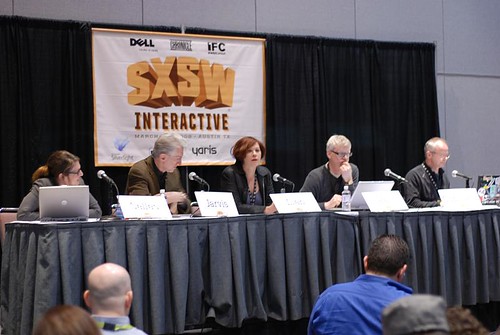Six Apart has launched a grand sounding scheme to rescue journalists from their capsizing employers. Simon Owens, writing for PBS’s MediaShift, forced me to think hard about the scheme. Turns out I gave it low odds of success:
Copeland told me that journalists — even good ones — often don’t adapt well to blogging. The medium requires more than good writing and reporting skills. You also have to know how to network and promote your content, something about which many journalists are clueless.
“Journalism is kind of like being a monologist, and journalists are very used to pontificating,” he said. “And I know a lot of people think that’s just what bloggers do, but bloggers are more like someone in an improv theater group. It’s just a different skill set.”
What makes a blog successful, Copeland argued, is its personality — or rather the blogger’s ability to connect that personality to his readership. Though he wouldn’t go so far as to say that these laid-off journalists weren’t cut out to be bloggers, he said at the very least they would need to understand that in the blogosphere you often have to become your own marketer.
“There’s just an awful lot of competition, which these people have not experienced recently,” Copeland said. “At a newspaper the competition is really at the corporate level, and once you’ve won your slot as the metro reporter for City Hall, you might have competition with one other reporter in the town, you might have zero competitors — either way it’s not very competitive. And for every 100 reporters that look for jobs online, only one of them is going to be paying the rent a year from now. And whether that’s with Six Apart or Blogads or Federated [Media], that’s really beside the point. The point is that only one of them will have an appreciable audience that can be monetized.
When we created Blogads in 2002, we dreamed of saving journalists from the inevitable collapse of their uneconomical employers. Turns out a lot of what I wrote then has come true:
As an information processor, the blogosphere superfluizes old media’s expensive and carefully constructed infrastructures and franchises.
Suddenly, Vivendi, AOL-Time Warner, EMAP and Newscorp are factories whose economies of scale are swamped by infinity, networks that have come unplugged, refrigerator salesmen trudging into the next ice age.
And
The old economics of media – he who controls distribution wins the most readers and serves advertisers best – will be plowed under by a new economics – she who relates best attracts the most valuable audience. (Since relate means connect and tell.)
The metrics do not yet exist to describe the blogosphere’s commercial potential. Anyone who blogs knows we are operating in a new dimension beyond brand or marketing footprint. The newspaper or TV station with 10 viewers has, um, let’s count them, 10 connections. The blogger read by nine other bloggers participates in a network of up to 45 direct human relationships. (I don’t know the formula — draw ten dots in a circle, connect each dot to every other dot, then count the lines.) 1,000 bloggers generate more communication value than 100,000 readers.
(Sure, a power law distribution may result, but the possibility of 500 million bloggers boggles traditional media — 10 blogs each may serve 100 million unique users a day, 1000 each will serve 10 million readers a day, 100,000 each will serve 1 million readers a day, 10 million will draw 1000 readers a day and 489,898,990 will serve 100 readers a day.)
Blogs serve passionate, activist citizens who eat, drink, drive, argue, influence and buy more voraciously than their couch-potato neighbors. (The blogger’s energy is a cause and effect of blogging, I think.) Blog readers, wired to value peer knowledge over brand, are a prime audience for new messages.
The blogosphere’s self-organized networks offer adventurous advertisers the opportunity to target unique and previously unarticulated demographics.
Advertising in a blog or blogset will enable an advertiser quickly to communicate with a critical mass of thinkers.
Too many words, but the sentiments were right. (Particularly if you substitute “social media” for “blogosphere.”)


